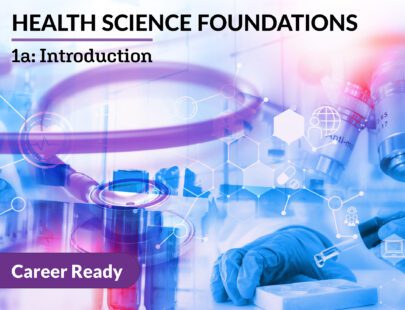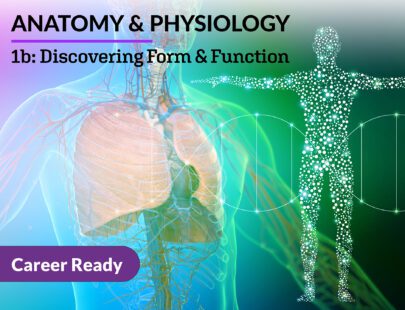
Pharmacology 1b: Analysis and Effects
When implemented with care, medicine can cure illnesses and even save lives, but when distributed incorrectly, therapeutics can cause great harm. In this course, you will delve deeper into the study of medicine and treatments available to patients. You will learn about available medications for specific diseases, the way therapeutics work in the body, different drug classifications, the law behind administering drugs, and what a Pharmacy career can look like. Are you ready to continue injecting your brain with essential knowledge for a career in the medical field? Let’s continue your journey of care.
Units at a Glance
Unit 1: Medications that Affect the Endocrine System
Do you know someone influential? Someone who walks into a room and has the ability to change the mood, the temperature, the type of music played? The endocrine system is to your body what that person would be to a party. The endocrine system works to regulate mood, tissue function, growth and development and metabolism. When it comes down to it, the endocrine system is in charge. It speeds up or slows down the other body systems in order to maintain homeostasis. When there is a deficiency in the endocrine system, it can be optimized through the administration of the medications you’ll learn about here.
What will you learn in this unit?
- Establish a method of study that will support your learning of the various classifications of medications in this course, recognizing key information that must be included
- Explain the anatomy and physiology of the endocrine system
- Describe type 1 diabetes and the various types of medications used for treatment
- Investigate type 2 diabetes, along with the various types of medications used for treatment
- Discuss the medications that are used to treat disorders of the thyroid gland
Unit 2: Medications used for Gender-Specific Health Issues
Unlike other body systems, the reproductive systems are not required to sustain the life of an individual. Still, they are necessary to produce and transfer the individual’s genes to their offspring. The glands and hormones of both the male and female reproductive systems also contribute to growth and development, emotional stability, and bone density. These body systems differ between males and females not only in their structure, but in their function as well. Here, we will explore the medications that can be used to optimize the reproductive systems to promote or prevent conception, along with those used to improve the quality of life when these systems fail.
What will you learn in this unit?
- Explain the anatomy and physiology of the female reproductive system
- Describe the various types of medications used to promote and prevent reproduction and those used to support women as they age
- Explain the anatomy and physiology of the male reproductive system
- Discuss the medications used to treat erectile dysfunction and illnesses that affect the prostate gland
Unit 3: Anti-infective Medications
When you hear about germs, what comes to your mind? You likely already know a bit about things like bacteria, viruses, and fungi. You probably understand that these microorganisms can cause great problems if they get into your body. But are these tiny organisms the same? How do they act once inside the human body? Let’s find out and then consider medications that will successfully fight them off so that the body is healthy once again.
What will you learn in this unit?
- Explain cellular structure and principles of microbiology
- Discuss the medications that are used to treat infections
- Describe the types of medications that are used to treat viruses
- Explain the difference between medications used to treat viruses and fungi
Unit 4: Medications Used to Treat Cancer
It’s likely that no matter which branch of medicine you decide to pursue, you will eventually come into contact with a patient who has a cancer diagnosis. Here, we’ll learn not only what cancer is and how it forms but also more about the most common types of cancer that you may run across. We’ll also consider the types of medications used to treat cancer and how they work to stem the spread of this disease in the body.
What will you learn in this unit?
- Illustrate how cancer occurs at the cellular level
- Describe the different types of malignancy
- Discuss cell-cycle specific antineoplastic medications
- Explain the characteristics of cell-cycle non-specific medications
Unit 5: Medications for the Eyes, Ears, and Skin
What type of music do you enjoy? What type of movies? What type of fashion? Believe it or not, many of the things we enjoy experiencing in life rely on just three vital organs. Although we may take them for granted, our ears, eyes, and skin are complex organs. We rely on them to function properly to enjoy our lives. Here, we will review the structures of these organs and discuss medications that can be used to treat illnesses that might strike them.
What will you learn in this unit?
- Discuss the anatomy and physiology of the ears
- Describe the anatomy and physiology of the eyes
- Explain the medications used to treat illnesses of the eyes and ears
- Discuss the anatomy and physiology of the skin
- Describe various skin conditions and the medications used to treat them
Unit 6: Immunologic Medications, Medications for Weight Loss, and Nutritional Supplements
Have you ever felt that you were coming down with something? Maybe you’re suddenly tired, feeling warm or chilly, and notice that your nose is running. Most people are annoyed at the onset of these symptoms but they actually signal that the body is doing its job. It is working hard to protect us! But what if it can’t do that vital job? How can medications be used to help us feel our best all the time? What roles do a person’s diet and behavior play in helping their bodies function correctly? We’re about to find out.
What will you learn in this unit?
- Describe the physiology of the immune system
- Explain the characteristics of medications used in immunostimulation and immunosuppression
- Discuss the medications used for weight loss
- Identify the nutritional needs of the body and the role of vitamin supplements in maintaining health
Unit 7: Careers in Pharmacy
Maybe the science of the body and its workings interests you, but the idea of dealing with bodily fluids turns you off on the idea of a career in health care. If that is the case, a career in pharmacy might be the best fit for you. Pharmacy professionals must understand how the body works naturally and how pharmaceuticals can be applied to help the body get back to homeostasis. Understanding which drugs are dangerous to combine as well as when and how to administer drugs are important skills for those who work in a pharmacy. Pharmacy is not all about pushing pills, though. The services that those who work in pharmacology render to the community include much more. Here, we’ll learn more about this unique field and what it takes to be a part of it.
What will you learn in this unit?
- Describe the various types of pharmacology and their purposes
- Explain the basic ideas and purpose of careers in pharmacoeconomics
- Compare and contrast different types of pharmacies
- Distinguish between various types of roles in the pharmacy
- Create a career plan to pursue a path in pharmacology
Unit 8: Legal and Ethical Issues in Pharmacology
You’ve learned about medications that affect all different parts of the human body, as well as how they work, how they are used, and their potential side effects. This knowledge is important in recognizing how powerful medications really are. Since they are so powerful and have the potential to greatly help or harm a patient, it makes sense that there are legal and ethical issues to consider when prescribing, dispensing, or administering medication. As a healthcare professional, you will endeavor to do what is best for your patient. Still, mistakes can happen. How do professionals in pharmacology balance ethical and legal issues while making sure that patients are given the correct medications with as few errors as possible? Let’s find out.
What will you learn in this unit?
- Explain the legal aspects of medication regulation
- Discuss ethical considerations related to medication administration
- Identify the potential areas for error in medication administration and the legal ramification of these errors
- Demonstrate how pharmacy professionals work to assure that medications are safely administrated to patients
Required Materials
Physical
- Paper, pens or markers
- Audio recording device
- Digital camera
Software
- Word processing software
- Presentation software
- Screen capture tool
Optional
- Television with cable or local network access (optional)








